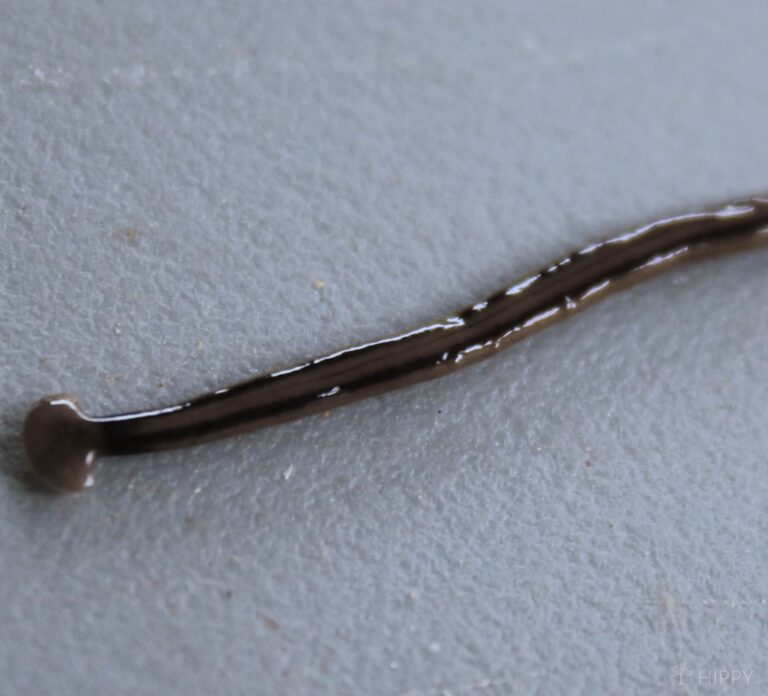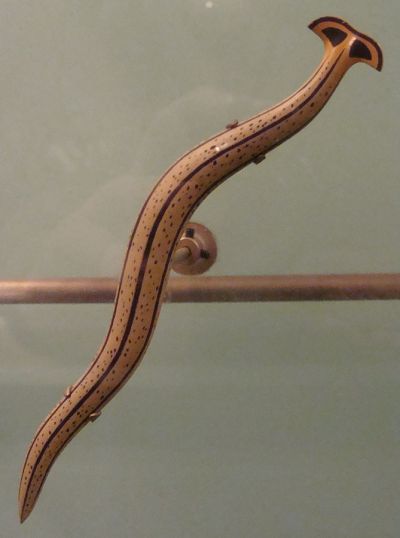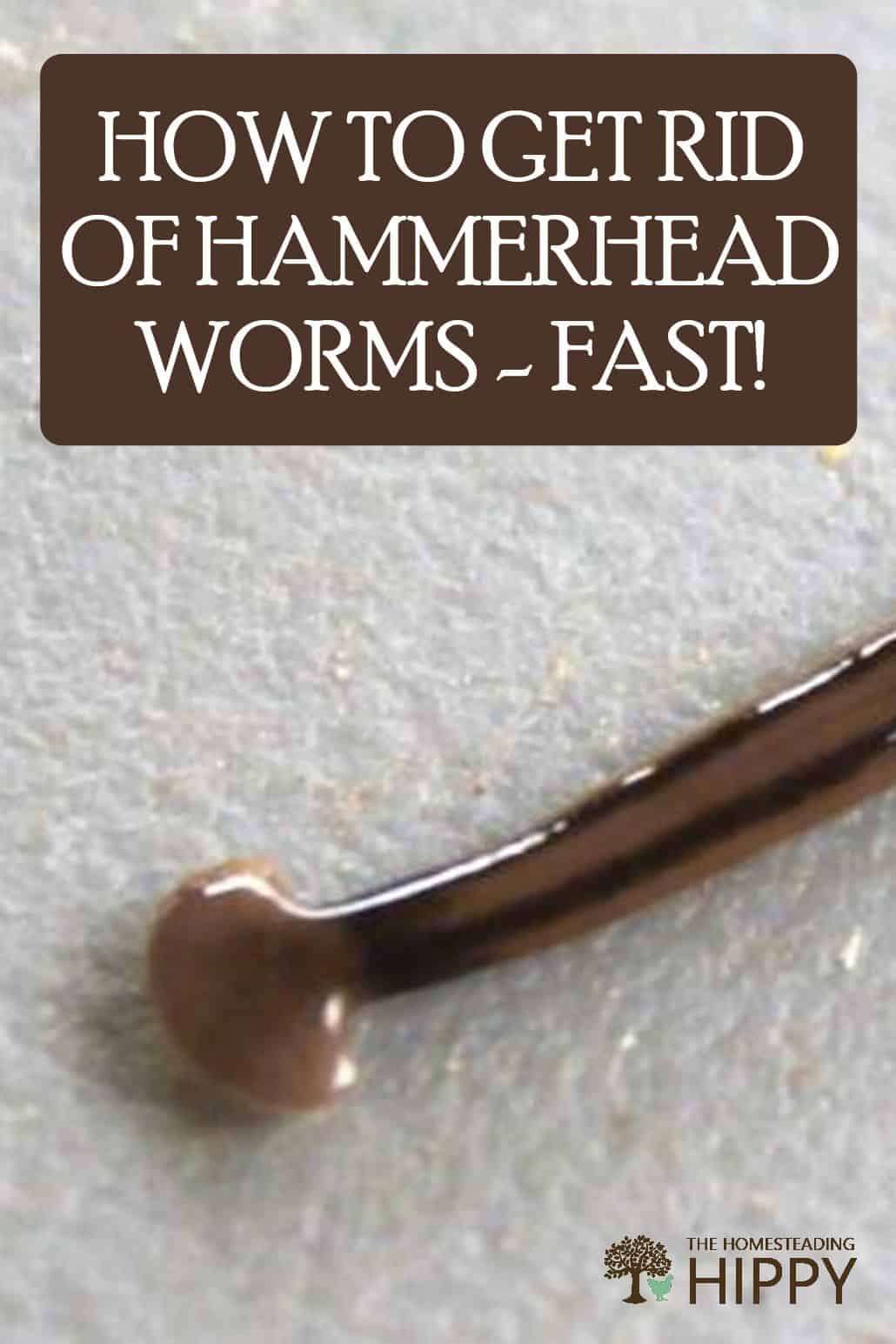Hammerhead worms (lat. Bipalium kewense) are an ecological nightmare in your garden. This predatory species of flatworm is highly invasive and feasts on earthworms, mollusks, and other hammerhead worms. They also have a regenerative ability that would make Wolverine and Deadpool jealous – which makes them that more difficult to kill.

Table of Contents
What Are Hammerhead Worms?
Hammerhead worms are known by a variety of different names, including hammerhead flatworms, arrowhead flatworms, and broadhead planarian (which is technically a larger category of flathead worms of which hammerheads are only one member).
Also known as “toxic terrestrial flatworms” these pests are carnivorous creatures that play on all kinds of other insects, like earthworms, insect larvae, snails, slugs, and even other hammerhead worms (that’s right – they’re cannibals).
They detect their prey with chemoreceptors located just below the head. Once they find the earthworm’s body, they press it against a surface and entangle it in slimy secretions of toxins, immobilizing it.
Then, the worm secretes digestive enzymes and sucks the liquefied tissue into its digestive tract with its cilia. Lovely.
A hammerhead worm can survive for several weeks on food reserves in its digestive tract – and if food is still scarce, it will actually cannibalize its own tissues for food.
Hammerhead worms are named for their distinctive heads, which are shaped like spades. They also have elongated, flat bodies that can be as long as more than a foot. They can be green, gold, brown, or gray. They move around like slugs, producing a slime trail as they do.
These creatures are considered harmful in most gardens because they feed so voraciously on earthworms.
As any gardener knows, earthworms are necessary to aerate and fertilize the soil – you absolutely need them if you’re going to grow a healthy garden.
Considered an invasive species, these pests are native to Southeast Asia but have been found in most parts of the US since the 1980s. They’re also found in just about every other corner of the world.
The good news about hammerhead worms is that you don’t usually need to worry about them unless you live in a place that is subtropical or tropical -they need high temperatures and high humidity. These creatures prefer damp areas and are light-sensitive so they typically feed at night.
As they move, they secrete a dense mucus. Some have stripes but others do not. They are frequently mistaken for snakes or slugs but are not actually related.
How Poisonous are Hammerhead Worms?
Hammerhead worms use a powerful neurotoxin (tetrodotoxin) to paralyze their prey. As far as dangers to people, they don’t prey on humans or household pets. That said, should your dog or cat eat one of these nasties, they will be very sick.
Where do these creatures live?
In general, they prefer warm, subtropical climates, but they’ve been reports of them in many states across the U.S. such as:
| Arkansas | California |
| Mississippi | Illinois |
| Massachusetts | Maryland |
| Georgia | South Carolina |
| North Carolina | Louisiana |
| Indiana | Pennsylvania |
| Puerto Rico | Alabama |
| Florida | Connecticut |
| Hawaii | Tennessee |
| Virginia | New York |
| Ohio | New Jersey |
| Oregon | Texas |
| Washington |
They are most common in the Gulf Coast region due to their need for a warm, humid climate. These invasive worms are often found as nursery plants or in greenhouses that are in colder parts of the country, too.
Hammerhead worms aren’t likely to bite humans but the chemical that they release can cause skin irritation in humans.
Although you probably won’t find yourself snacking on a hammerhead worm, the neurotoxin can also cause nausea when ingested – something to be aware of if you have pets or small children who like to put things in their mouths.
They are not harmful to humans but can be extremely dangerous to a garden. They’ll Decimate the earthworm population in your soil if you aren’t careful about taking care of them.
The worst part is that hammerhead worms have no known predators. Most animals won’t eat them because they secrete a foul slime.
Difficulty in Killing Them
Hammerhead worms are, as previously noted, very hard to kill. If you cut them in half, they regenerate into two worms. Two worms become four worms and so the cycle goes on.
That’s right – cut off the head and a new one will grow in its place. Creepy – and it makes these pests super hard to kill. You can’t just smash one up and squish it to kill it. It will regenerate quickly.
Not only that, but hammerhead worms prefer to hide in dark, secluded areas. They’re most active at night and on cloudy, rainy days.
That said; it’s not impossible to kill these pesky troublemakers – you just need to use the right stuff.

What Are Hammerhead Worms Good For?
With all the downsides of hammerhead worms, you might be wondering if these creatures pose any benefits, as do some types of insects that we might consider garden pests.
Unfortunately, there aren’t any known benefits of hammerhead worms – all the more reason to get rid of them if you find them setting up shop in your garden.
Unlike earthworms, who do a lot of hard work to aerate compacted soil and convert organic matter into nutrients that feed our plants, hammerhead worms really don’t serve any kind of purpose in the natural environment. Remember – they’re invasive.
How Long Do Hammerhead Worms Live?
It’s not really clear how long hammerhead worms live.
The difficulty in estimating this species’ lifespan comes from the fact that they regenerate asexually.
Although they can reproduce sexually – fertilized eggs develop inside the hermaphroditic worm’s body and then are shed as capsules, hatching after three weeks – asexual reproduction is much more common.
Like other planaria, hammerhead worms are virtually immortal. A worm reproduces by fragmentation, with each section of the worm growing into a fully-developed organism in just a few weeks.
Yikes.
How Do I Kill Hammerhead Worms?
There aren’t many ways to kill these little pests but the best way is to dissolve them. Yes, you read that correctly; you must dissolve them in certain substances in order to kill ‘em.
The things that work are:
- ☑ Salt
- ☑ Vinegar
- ☑ Citrus Oil
- ☑ Boric Acid
- ☑ Soap Sprays
Regardless of the type of solution you turn to in order to get rid of hammerhead worms, it’s a good idea to capture it first.
Put the hammerhead worm or worms in a sealable plastic bag or plastic container. That way you can ensure you will be able to apply your solution effectively without the worm getting away first.
When you pick up the worm, make sure you use a rag, rubber or work gloves, or even a stick.
You don’t want to get any residue from the worm on your hands so don’t something think like a paper towel or a napkin…
After applying your solution and disposing of the dead hammerhead worm, treat the container with salt and put it in the freezer for 48 hours. This will help you disinfect it. You can also use a glass container and disinfect with alcohol.
Don’t forget to disinfect your hands, too, just in case. Use hand sanitizer or in warm, soapy water for at least 20 seconds.
Use Salt or Vinegar
Pouring salt or vinegar on them is probably the easiest way to kill them because we all have both of them in our kitchens.
Now, in order for salt to work you have to completely cover the worm in it and make sure it’s completely dissolved before washing out the container. Sprinkle salt all over the body of the creature, ideally with it still contained in a jar.
With that said, this method won’t work too well if you’ve got an infestation on your hands. It takes some time to get rid of all the pests in this way.
Try Citrus Oil
Citrus oil is another effective solution that can be used to help you get rid of hammerhead worms.
The only downside to this solution is that, like salt or vinegar, it has to be applied directly to the body of the hammerhead worm in order to kill it. It can’t be used as a general broadcast solution.
Instead, you may just want to choose a certain day to go “hammerhead hunting” in your garden. The best time to do this is first thing in the morning, when the soil is damp and you’re most likely to find worms on the surface of the soil.
Spray the entire worm until it is completely immersed in citrus essential oil. Spray at least once a week in the garden to make sure you’ve killed off all the worms and reduced the chances of them distributing their eggs in your garden too.
Boric Acid
Boric acid can be used to raise the acidity of the soil in your garden. Hammerhead worms can’t handle highly acidic soil. Raising the acidity on a large scale means that you won’t have to worry about an infestation of hammerhead worms in your garden.
Boric acid can be applied every two weeks. Just keep in mind that this kind of soil amendment may also make it more difficult for certain types of plants to grow, so you may be getting rid of one problem only to have to deal with another.
Soap Sprays
Soap sprays can be used to smother hammerhead worms. Some good options include insecticidal soap spray, which we’ll discuss in more detail below.
These are highly toxic so you need to be careful about how and when you apply them (you don’t want to accidentally kill off populations of beneficial insects), but very effective.
As far as application goes, once again; you have to spray each one individually to kill them off.
If you’re looking for a less toxic alternative to insecticides, you can also use neem oil. Derived
From the neem tree, neem oil doesn’t have much of an effect on beneficial earthworms and insects but can be highly effective at getting rid of more malignant creatures like hammerhead worms.
What Insecticide Kills Hammerhead Worms?
You can also use certain synthetic pesticides if you can’t find the natural stuff. Although, it’s important to note that both natural and synthetic pesticides could potentially be harmful to humans and pets so be careful with them.
If you decide to use an insecticide, pyrethrum is one of your best options. Some people actually consider pyrethrum and other pyrethrin products to be somewhat natural since they are made out of an extract from the pyrethrum daisy.
Sprays can be used against hammerhead worms, as can dust. They can be mildly toxic to humans but the good news is that they break down quickly in the environment.
Another pesticide you can use is one in the carbamate or organophosphate family. Carbamates are slightly less toxic than organophosphates but don’t last as long. Both work to interact with enzymes and disrupt nerve impulses in the body of a hammerhead worm.
How to Prevent Hammerhead Worms
There are a few key steps you can and should take to ensure that hammerhead worms never become a problem for you or your garden.
These worms were first brought to the country in horticultural plants. Since 1901 these creatures have frequently been found in greenhouses, hiding in plants where they are then distributed to new properties. Since they have no natural predators, it’s easy for these creatures to rapidly proliferate.
Although they are only able to live year-round in places with warm tropical climates like Texas and coastal regions, they can live in greenhouses all over the world. You may spot them on top of the soil after the rain.
If you live in a tropical area, have a greenhouse, or grow greenhouse-grown plants in containers, do a thorough inspection of your plants and your soil to make sure they don’t contain any of these worms.
You’re most likely to spot them on top of the soil after heavy rainfall.
If you do happen to find them, destroy the worms, but take a photo first. It’s a good idea to send a picture of the local cooperative extension service, the department of natural resources in your state, or the invasive species institute in your state, if you have one.
All of these places keep track of invasive species like the hammerhead worm, and it’s important for them to be able to get an accurate count and location of the worms.
Should I Kill Hammerhead Worms?
Yes, if you notice hammerhead worms in your garden, it’s important that you kill them as soon as possible. They regenerate so quickly and easily – and are such ruthless earthworm predators – that you really don’t want to let them hang around for too long.
Each of the above-mentioned methods will act quickly to deal with a hammerhead worm problem – just keep the scale of the problem in mind when deciding how to handle it.
The fastest method would probably be to use salt or vinegar, but then you’d have to catch the worms and put them in a container which, when dealing with an infestation, is quite tricky.
Do your best to be vigilant in the garden and to destroy hammerhead worms when you notice them. With any luck, this is a problem that you can get rid of with some serious dedication!
FAQ
Sadly, nothing eats this worm, so you’ll have to kill all of them yourself.
No, it’s not safe. Make sure your dog stays away from them, as dogs are more curious in nature. If your pet does ingest one, take it to your vet ASAP.
No, it’s not. Avoid touching these things.
No, they won’t bite you, but nevertheless, you should avoid touching one.
No, because the worm will regenerate? Smashing doesn’t work, either.
No, don’t let them eat these worms, as the neurotoxin tetrodotoxin will make them sick.


Greg spent most of his childhood in camping grounds and on hiking trails. While he lives in the suburbs nowadays, Greg was raised on a small farm with chickens. He’s a decent shot with a bow, and a huge knife enthusiast. Find out more about Greg.

I’m finding alot in my yard I’m scared for all my earth worms. I’m in North Alabama
Kim, I’m in Birmingham and have been killing lots of these with salt this season. So gross!! I’m going to treat with Neem Oil as soon as this rain stops! Have you had any luck getting rid of yours?
I have them in Childersburg as well. Just gathered several from my kids pool. I was throwing them in a bucket while catching them. They dried out quickly in the sun.
I’m in Northwest Al and today after a heavy downpour found one sliming up my kitchen door. I used a sandwich bag and captured without touching, took pictures and will be pouring the vinegar in the bag for disposal.
I saw one last summer in my raised garden bed. I’m worried about more being in there and also in the soil around my home and property. Do they survive in freezing temperatures that we sometimes have in North Georgia? I have lots of earthworms and don’t want them destroyed by the disgusting, gross hammerhead worm.
YES THEY SURVIVES FREEZES
not the same jody– but yes We live in Texas and that ARTCIS few days we had that was WELL under freezing- I found them huddled UNDER my pots.. Poured vinegar on them to kill them These things are worse than ROACHES LOL
I have found a Hammerhead Worm in Preston County West Virginia. I was gathering rocks and putting them in my tractor bucket when I saw a worm on one of the rocks. I would bet my life on it being a Hammerhead Worm. I have 3 pictures of it that I took with my cell phone. Pics are all that great but an expert could tell it is the culprit. One of my Doberman Pinschers suddenly got ill and died a couple of days after I found this worm and I am wondering if another worm had anything to do with that? I reported the worm and sent pics to WV DNR and to the Preston County Co-op Ext.
How much boric acid do you apply?
I have never heard of boric acid killing Hammerhead worms.
Saw my first hammerhead worm today. My earthworms have disappeared over last two years. Had me puzzled until today. I smashed that one today, if it survived what I did we will never win the battle. Also first year no catapillers or insects in garden. Now I know.
dissolving them with salt or vinegar is the only way. any parts can grow heads.
1) can hammerhead worms live in digestive system.
If in digestive system.
What do you do to. Rid them
just found two of these I live in SWVA (Virginia near the tri state border) Va Nc Tn. So this is BAD news. put both in seperate bags and salted them then salted the area in which they were found thuroughly.
We have them bad here in Charlotte NC. Is there nothing to treat your yard with? Like something that won’t kill your lawn and plants? Has any one had luck with an exterminator to treat property? If so who? Kill 10 last night in our drive way. Help?
I use my propane torch to incinerate da buggers here in Hawaii.
Seems to kill them dead. No chance to regenerate a fried slimey